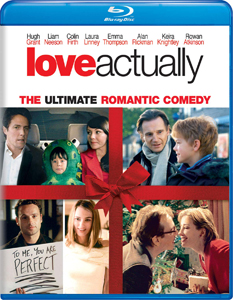“Love Actually” (2003) starts off so lovable – safely mainstream, but with touches of cynicism to undercut that when needed — that one wonders if there’s ever been a larger cast of talented comic actors assembled for one film. They all get rich short films to work with, woven together into a 2-hour tapestry.
Nine degrees of separation
Writer-director Richard Curtis starts with that trickiest of writing tasks: a purposely bad yet hilariously catchy song, “Christmas is All Around,” sung by washed-up Billy Mack (Bill Nighy, channeling a bit of Austin Powers). Curtis and his team use sharp needle drops and precise laugh-cry parabolas to keep the nine-storyline film in our good graces.
Not every decision is as awkwardly perfect as “Christmas is All Around.” “Love Actually” isn’t the greatest Christmas movie ever, or the greatest movie about love. But it is the best movie about those topics released on Nov. 7, 2003. That seems to be damning it with faint praise until you realize “Elf” also came out that day.

“Love Actually” (2003)
Director: Richard Curtis
Writer: Richard Curtis
Stars: Hugh Grant, Martine McCutcheon, Liam Neeson
Across a December in London, everyone interacts via the six-degree rule (something TV’s “Six Degrees” attempted more robustly in 2006, but the trend had passed and it was axed). But the structure is not a crucial part of the film.
What’s more impressive is that even though this is a rom-com, we’re 75 percent free from cliches as we explore various types of love: romantic, family and friendship; innocent and guilty; requited and unrequited; tragic and humorous. The film has no villains but is crushingly honest about the pain of love; this isn’t a “love makes the world go ’round” schmaltz-fest.
A collection of moments
Everyone will pick different favorite moments, but I’m drawn to this handful:
- Stepfather Daniel (Liam Neeson) is relieved that the problem plaguing grade-school stepson Sam (Thomas Brodie-Sangster, who grew up to be a “Maze Runner”) is merely that he’s crushing on a classmate. But then he reflects for a moment and sees the kid’s point about “the total agony of being in love.” This isn’t strictly a laugh line.
- Mark (Andrew Lincoln) is in love with his best friend’s fiancée, Juliet (Kiera Knightley). He shares his feelings via the now-famous hand-written cards, he walks away, she kisses him, and then he says to himself “That’s enough.” Although there is no doubt a cross-section of viewers who will label Mark “creepy,” he draws his own line maturely enough that his unrequited feelings perhaps play as sweet to another cross-section.
- As Mark gives a lesson in how to handle forbidden love, we want to be the teacher and shout “Enough!” at Harry (Alan Rickman), who is considering cheating on wife Karen (Emma Thompson) with his employee, Mia (Heike Makatsch), who is throwing herself at him.
- Thompson has a powerful moment of private crying; Karen then composes a happy face for the grandkids. What breaks my heart even more is Sarah (Laura Linney) having to give up her dream guy, Karl (Rodrigo Santoro), just as things are clicking because she’s so glued to the phone for her mentally ill brother. A needle drop of Eva Cassidy’s “Songbird” at the moment we grasp this conflict is an aural cheat, but it’s nonetheless heartbreaking.
- Yet on this viewing, my tears for some reason flowed during Jamie’s (Colin Firth) proposal to Aurelia (Lúcia Moniz) via stunted Portuguese, with her response coming in stunted English. (Subtitles help us.)
“Love Actually” probably isn’t trying for a theme other than the bland “love unites everyone,” but I like to think the Jamie-Aurelia thread most defines the film, because it underscores that love isn’t about words. While Sam aims to track down Joanna (Olivia Olson) and “tell her how he feels,” there’s no scene with that cliched dialog — a parallel to how Mark never speaks the words to Juliet. On this point, Curtis gets right what so many rom-coms get wrong.

A side trip to fantasy land
That’s not to say “Love Actually” doesn’t allow room for criticism. I’ve mentioned all these emotionally true moments, but I must admit they are glamorized. Firth and fellow rom-com icon Hugh Grant are in this film, and Santoro is straight from central casting as a too-selfless-for-her-own-good woman’s dream guy.
And dang, I wish the ultra-comedic storyline wasn’t in here. The goal of unlucky-in-love Colin (Kris Marshall, the British answer to Matthew Lillard) is to go to America, where beautiful women will be instantly won over because he has a British accent. Granted, you’ve likely seen this phenomenon play out IRL in bars.
However, Curtis can’t stop himself from going so over the top that the thread has to be revealed as a dream sequence — but it’s not! Colin draws the instant, obsessive affections of women played by Elisha Cuthbert, January Jones, Ivana Milicevic, Shannon Elizabeth and Denise Richards. Yes, cinematic portrayals of romance that intend to draw wide audiences are always set in fantasy land, but I cringe over Colin’s storyline being in the same movie as Mark’s and Sarah’s.
“Love Actually” is a film of powerful moments more than a complete statement. Unless that statement is: Love is an ugly mess that can’t be universally defined. But voiceover narration (atop people reuniting in airports IRL) tells us that’s not the message. Rather, it’s this: Love is all around us, and it actually overwhelms hate.
I suspect the film was not storyboarded to the minute by Curtis; I’m guessing he felt his way through the storylines. However it gets there, and however much I might want to analyze specific choices, “Love Actually” is ultimately effective, hitting far more than missing. If you’re a guy who has as much trouble expressing emotions as Billy Mack and his longtime manager, watch it alone so no one can see you cry. Take heart that you’ll laugh some, too.

